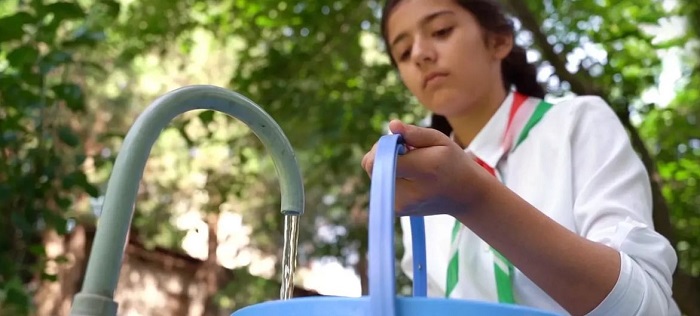Climate change has already irreversibly changed the lives of everyone all around the globe, with children bearing the heaviest burden. Concerned about water shortages, air pollution and increased heat waves, children and young people in Central Asia are taking measures to protect their future.
Saving water at school
Fifth graders from the city of Shchuchinsk (Kazakhstan) have recently developed an eco-project in their schools and local communities as part of a program for the development of social entrepreneurship.
Yaroslav, who was concerned about the problems caused by the attitude to natural resources, led the team of students. “TV shows about the drying up of rivers and lakes, which causes people to suffer from lack of water, have always made a strong impression on me,” he says.
Yaroslav had an idea to install drinking water consumption monitoring devices.
“I have a picture in front of my eyes: schoolchildren approach a drinking fountain to get drunk, turn on the tap, and then get distracted by their friends. Meanwhile, the water pours and pours. How much water is being wasted?”, Yaroslav elaborates.
“Therefore, when my teacher invited us to take part in this project and told us what we would do, I immediately had an idea: “I will make sure that the water does not flow just like that.”
After heated discussions, all participants voted to promote the idea of a school drinking fountain. If this initiative brings significant positive results, sensors will also be installed in other areas of the school, such as sinks and washbasins.
“Whether we can bring our idea to life or not, participating in the project has taught us a lot”, Yaroslav says.
“We realized that nature conservation is our responsibility. Each of us, even a high school student, has something to offer. And, most importantly, we have support. Not only adults can carry out nature conservation activities – schoolchildren are also able to contribute.”
The choice is yours!
Children in Tajikistan use art to highlight the importance of access to safe water supply, sanitation and hygiene. Fotima Zokova, a sixth-grade student from Dushanbe, became one of the winners of the art competition dedicated to the Youth and Children’s Water Forum organized by UNICEF.
“My drawing contains the main key message,” says Fotima.
“The choice is yours! You can choose to live in a beautiful world or in a world with a polluted environment. Everything in the world depends on water, if there is no water, there is no planet.”
“Many people use water incorrectly,” she continues.
“For example, they throw garbage into the water or leave the faucet open when they leave. This is wrong – we have to conserve water. We will be lost without water.”
Innovative water supply technologies
Recently, Shahzoda and her team won first place in the regional competition “Seeds of the Future” for the best project in the category “Technologies for good”.
“In Uzbekistan, we are facing a serious problem of water shortage, so that some farmers use groundwater for irrigation. Unfortunately, such water often contains large amounts of salts and heavy metals, being unsuitable for agricultural purposes,” says Shahzoda.
To tackle this problem, Shahzoda and eight other students have developed an Aquatibia water filter equipped with special sensors, which is able to desalinate and purify water. The device works as a water purification filter, removing salts, heavy metals and other particles making water safe for irrigation. The filter uses natural material made from wood waste, and the sensors also collect water quality data and send it to cloud storage using energy-efficient Long-Range technology. Such data is further available for farmers through a mobile app, providing valuable tool for irrigation management.
The team implementing this initiative aims to reduce wood waste in Uzbekistan and contribute to the closed-loop economy through the use of wood waste as a filtration agent.
“This idea was the result of joint efforts. The initial concept was proposed by a chemistry student from our team who was conducting research on a filtration agent to improve desalination and filtration of water. Nevertheless, we, along with other students with experience in computer engineering, have contributed to making it “smart” and more insightful,” explains Shahzoda.
“This is important for our country, as Uzbekistan is heavily dependent on the agricultural sector.”
Shahzoda took part in the 28th United Nations Climate Conference (COP28) in the United Arab Emirates.
“I didn’t know much about the amount of carbon emissions that humanity produces every year,” she says.
“However, since then I have learned more, including that the water sector is also responsible for a fairly large share of emissions. It was certainly a revelation for me to learn about the decarbonization strategies and goals in the water supply industry that have been established by some countries. In addition, my favorite event within the framework of COP-28 was a visit to the Startup Village in the Green Zone, where I learned a lot about startup companies focused on sustainable development. One of these companies has been working on collecting and recycling water in areas with a humid climate, for example on sea coasts, to use such water for various purposes.”
Millions of children in Central Asia are experiencing acute water deficit. Water scarcity is based on a complex indicator of basic water stress, seasonal and interannual fluctuations, a decrease in groundwater levels and the risk of drought. Higher values of the indicators warn on a higher risk of water shortage.
About 3.8 million children do not have access to basic drinking water, and 4.5 million children face extreme vulnerability to water shortages. The UNICEF Vulnerability Index for access to water resources is based on a comprehensive indicator of water scarcity and the level of drinking water supply.
UNICEF is working with partners in the region to strengthen water supply systems and ensure reliable access to sufficient safe water for children and families. ///originally published by UN News, 30 March 2024
